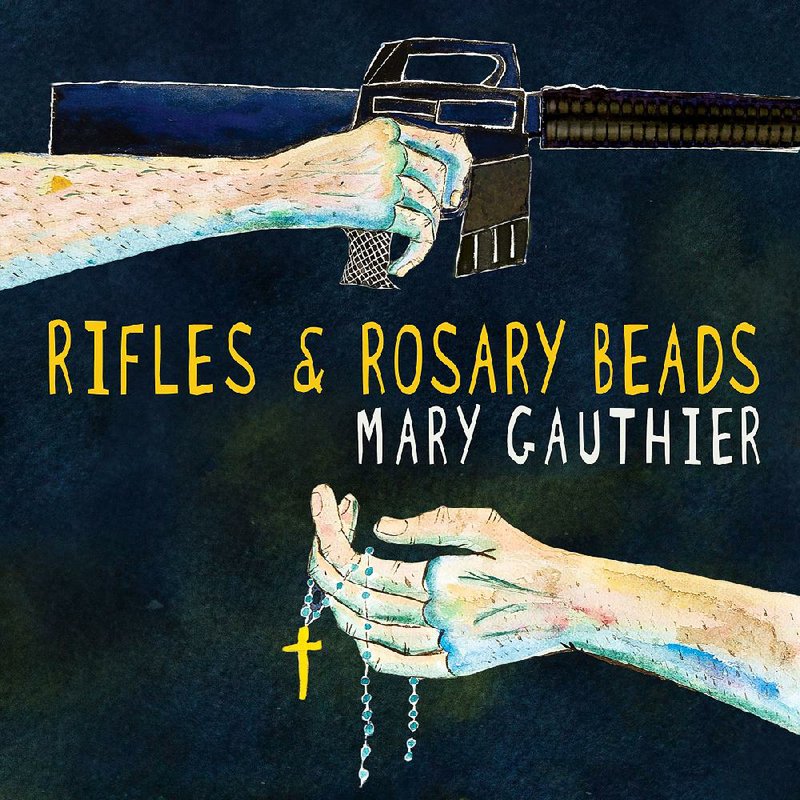Mary Gauthier is a gifted singer-songwriter whose rootsy songs tap her own life experiences in compelling ways, illuminating her shadows and ours. Her struggles with addiction and abandonment have fueled songs that often cut so deeply we feel the sting.
Perhaps best known for the devastating "I Drink," Gauthier wastes few words in her work, getting right to the point. "March 11, 1962" is another of her profoundly heart-rending songs that marks the day she was born and given to an orphanage. Her greatest gift may well be her innate ability to transform her own experience and pain into an undeniably personal, yet universal experience.
But Gauthier's new album, Rifles and Rosary Beads (30 Tigers, Rated A+), takes a different direction. None of the songs are autobiographical.
Gauthier shifts her focus to the stories of American veterans through her four-year involvement with the Texas nonprofit SongwritingWith: Soldiers. She has participated in the organization's songwriting retreats -- usually a dozen or so wounded combat veterans and four songwriters. When she was invited to participate, Gauthier wasn't so sure about it.
"I didn't feel I knew how to be in the presence of that much trauma without being afraid. Turns out, I was able to sit with the veterans with a sense of calmness and help them articulate their suffering without fear," she says in a news release accompanying the album.
Gauthier says they all have to stay focused, listen carefully and make sure each veteran gets his or her own song: "They don't know that songs can be used to move trauma."
But Gauthier does. In many interviews, she has said songwriting saved her. "It's what I think the best songs do, help articulate the ineffable, make the invisible visible; creating resonance, so that people, including the songwriter, don't feel alone."
These songs illuminate the complexity of war's impact on the soldier, the family and friends left behind and the distance that separates them. The songs are a path to understanding for them and us.
THE SONGS
"My job as a songwriter is to find that thing a soul needs to say," Gauthier says.
In these 11 songs co-written by Gauthier, the male and female veterans bare their souls in songs that radiate their pain, fear, and confusion, as well as the challenge of communicating who they are now with loved ones at home.
Gauthier's emotionally rich, textured voice infuses each song with empathy and compassion.
Take the opener, "Soldiering On": "What saves you in the battle can kill you at home" Gauthier sings, in a tune that explores the psychic wounds of war. "The War Within the War" comes from the spouse's perspective of how a relationship changes after the soldier's war's experience; it is clear they also are casualties of war: "Who's gonna care for the ones who care for the ones who went to war?"
Survivor's guilt haunts several songs, including "Still on the Ride," about a soldier's best friend who died. "I shouldn't be here/You shouldn't be gone," Gauthier sings. "But it's not up to me/Who dies and who carries on."
"Brothers" is a powerful song about the struggles women face: "You broke my heart on Veterans Day/Don't you understand the words you say?/You raised a flag for the men who served/What about the women what do we deserve?/I was just like you when the bullets flew." The title of "Stronger Together" hints at an uplifting theme, but reality bites as the spouses testify: "They say no man's left behind, but that ain't true/They hate it that they need us but they do" ... "They're hurt in places that the eye can't see/We miss the man our husband used to be."
On "Bullet Holes in Sky," a man shares his mixed feelings about Veterans Day: "They thank me for my service and wave those little flags/They genuflect on Sundays and yes, they'd send us back/But I believe in God and country and in angels up on high/And in heaven shining down on us through bullet holes in the sky."
The songs of Rifles & Rosary Beads are voices we need to hear. And listen closely to. The truths in these songs are tough, though rendered with great tenderness. We are face to face with a real challenge -- supporting these men and women without judgment as they struggle to survive. The trauma, the anger, the fear, the loneliness and more in these songs are real. We see the human faces of these survivors of war through these songs and we feel their struggle. Our hearts should be touched and we should be moved to action.
Email:
ewidner@arkansasonline.com
Style on 03/06/2018

